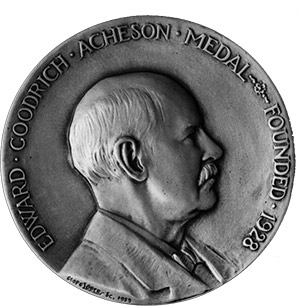NEW Nomination period: October 31, odd years – January 31, even years
Presented: Fall meeting, even years
 The Edward Goodrich Acheson Award was established in 1928 to recognize distinguished contributions to the advancement of any of the objects, purposes or activities of The Electrochemical Society.
The Edward Goodrich Acheson Award was established in 1928 to recognize distinguished contributions to the advancement of any of the objects, purposes or activities of The Electrochemical Society.
Eligibility criteria
The recipient is distinguished for contributions consisting of:
- Discovery pertaining to electrochemical and/or solid state science and technology;
- Invention of a plan, process or device or research evidenced by a paper embodying information useful, valuable, or significant in the theory or practice of electrochemical and/or solid state science and technology;
- Distinguished service to the Society;
- ECS membership is required.
Nomination guidelines
A complete nomination package includes:
- Completed electronic Award Nomination Form;
- At least two, but no more than five supporting letters (one page in length);
- Additional documents that may be included:
- Candidate’s curriculum vitae;
- Publications list;
- Other pertinent information supporting and strengthening the candidate’s nomination.
Nominations are considered in effect for two consecutive award cycles.
This award’s subcommittee members may not submit nominations or letters of support during their terms.
Award
The award consists of:
- Gold medal with the recipient’s name;
- Plaque bearing a bronze replica of the medal, with the recipient’s name;
- USD $10,000;
- Complimentary meeting registration for the award recipient and companion;
- Dinner held in the recipient’s honor during the designated meeting;
- ECS Life Membership.
Recipient obligations
At the designated Society meeting at which the the award is presented, the recipient delivers a general address on a subject related to the contributions for which the award is given.
About Edward Goodrich Acheson
Edward Goodrich Acheson (1856-1931) was an American chemist and inventor of the Acheson process, which is still used to make silicon carbide (carborundum). With Thomas Edison, Acheson experimented on making a conducting carbon to be used in the electric light bulb. Acheson, who went on to manufacture carborundum and graphite, served as the 6th President of The Electrochemical Society.
Questions
Contact awards@electrochem.org with questions or for more information.
Review the Society’s robust Honors & Awards and Fellowships & Grants Programs.
Recipients
2002-2024
Paul Kohl
(2024)
Yue Kuo
(2022)
Esther Takeuchi
(2020)
Tetsuya Osaka
(2018)
Barry Miller
(2016)
Ralph J. Brodd
(2014)
Dennis W. Hess
(2012)
John S. Newman
(2010)
Robert P. Frankenthal
(2008)
Vittorio de Nora
(2006)
Wayne L. Worrell
(2004)
Bruce Deal
(2002)
1976-2000
Larry R. Faulkner
(2000)
Jerry M. Woodall
(1998)
Richard C. Alkire
(1996)
J. Bruce Wagner, Jr.
(1994)
Dennis R. Turner
(1992)
Theodore R. Beck
(1990)
Herbert H. Uhlig
(1988)
Eric M. Pell
(1986)
Norman Hackerman
(1984)
Henry C. Gatos
(1982)
Ernest B. Yeager
(1980)
Dan A. Vermilyea
(1978)
N. Bruce Hannay
(1976)
1952-1974
Cecil V. King
(1974)
Charles W. Tobias
(1972)
Samuel Ruben
(1970)
Francis L. LaQue
(1968)
Warren C. Vosburgh
(1966)
Earl A. Gulbransen
(1964)
Charles L. Faust
(1962)
Henry B. Linford
(1960)
William J. Kroll
(1958)
Robert M. Burns
(1956)
George W. Heise
(1954)
John W. Marden
(1952)
1929-1950
George W. Vinal
(1950)
Duncan A. MacInnes
(1948)
H. Jermain Creighton
(1946)
William Blum
(1944)
Charles F. Burgess
(1942)
Francis C. Frary
(1939)
Frederick M. Becket
(1937)
Frank J. Tone
(1935)
Colin G. Fink
(1933)
Edwin Fitch Northrup
(1931)
Edward Goodrich Acheson
(1929)
